- Home
- Anthony Trollope
The Way We Live Now Page 9
The Way We Live Now Read online
Page 9
CHAPTER VII.
MENTOR.
Lady Carbury's desire for a union between Roger and her daughter wasgreatly increased by her solicitude in respect to her son. SinceRoger's offer had first been made, Felix had gone on from bad toworse, till his condition had become one of hopeless embarrassment.If her daughter could but be settled in the world, Lady Carbury saidto herself, she could then devote herself to the interests of herson. She had no very clear idea of what that devotion would be. Butshe did know that she had paid so much money for him, and would haveso much more extracted from her, that it might well come to pass thatshe would be unable to keep a home for her daughter. In all thesetroubles she constantly appealed to Roger Carbury for advice,--which,however, she never followed. He recommended her to give up herhouse in town, to find a home for her daughter elsewhere, and alsofor Felix if he would consent to follow her. Should he not soconsent, then let the young man bear the brunt of his own misdoings.Doubtless, when he could no longer get bread in London he would findher out. Roger was always severe when he spoke of the baronet,--orseemed to Lady Carbury to be severe.
But, in truth, she did not ask for advice in order that she mightfollow it. She had plans in her head with which she knew that Rogerwould not sympathise. She still thought that Sir Felix might bloomand burst out into grandeur, wealth, and fashion, as the husband of agreat heiress, and in spite of her son's vices, was proud of him inthat anticipation. When he succeeded in obtaining from her money, asin the case of that L20,--when, with brazen-faced indifference to herremonstrances, he started off to his club at two in the morning, whenwith impudent drollery he almost boasted of the hopelessness of hisdebts, a sickness of heart would come upon her, and she would weephysterically, and lie the whole night without sleeping. But could hemarry Miss Melmotte, and thus conquer all his troubles by means ofhis own personal beauty,--then she would be proud of all that hadpassed. With such a condition of mind Roger Carbury could have nosympathy. To him it seemed that a gentleman was disgraced who owedmoney to a tradesman which he could not pay. And Lady Carbury's heartwas high with other hopes,--in spite of her hysterics and her fears.The "Criminal Queens" might be a great literary success. She almostthought that it would be a success. Messrs. Leadham and Loiter, thepublishers, were civil to her. Mr. Broune had promised. Mr. Bookerhad said that he would see what could be done. She had gathered fromMr. Alf's caustic and cautious words that the book would be noticedin the "Evening Pulpit." No;--she would not take dear Roger's adviceas to leaving London. But she would continue to ask Roger's advice.Men like to have their advice asked. And, if possible, she wouldarrange the marriage. What country retirement could be so suitablefor a Lady Carbury when she wished to retire for awhile,--as CarburyManor, the seat of her own daughter? And then her mind would fly awayinto regions of bliss. If only by the end of this season Henriettacould be engaged to her cousin, Felix be the husband of the richestbride in Europe, and she be the acknowledged author of the cleverestbook of the year, what a Paradise of triumph might still be open toher after all her troubles! Then the sanguine nature of the womanwould bear her up almost to exultation, and for an hour she would behappy, in spite of everything.
A few days after the ball Roger Carbury was up in town, and wascloseted with her in her back drawing-room. The declared causeof his coming was the condition of the baronet's affairs and theindispensable necessity,--so Roger thought,--of taking some steps bywhich at any rate the young man's present expenses might be broughtto an end. It was horrible to him that a man who had not a shillingin the world or any prospect of a shilling, who had nothing and neverthought of earning anything, should have hunters! He was very much inearnest about it, and quite prepared to speak his mind to the youngman himself,--if he could get hold of him. "Where is he now, LadyCarbury;--at this moment?"
"I think he's out with the Baron." Being "out with the Baron" meantthat the young man was hunting with the stag hounds some forty milesaway from London.
"How does he manage it? Whose horses does he ride? Who pays forthem?"
"Don't be angry with me, Roger. What can I do to prevent it?"
"I think you should refuse to have anything to do with him while hecontinues in such courses."
"My own son!"
"Yes;--exactly. But what is to be the end of it? Is he to be allowedto ruin you, and Hetta? It can't go on long."
"You wouldn't have me throw him over."
"I think he is throwing you over. And then it is so thoroughlydishonest,--so ungentlemanlike! I don't understand how it goes onfrom day to day. I suppose you don't supply him with ready money."
"He has had a little."
Roger frowned angrily. "I can understand that you should provide himwith bed and food, but not that you should pander to his vices bygiving him money." This was very plain speaking, and Lady Carburywinced under it. "The kind of life that he is leading requires alarge income of itself. I understand the thing, and know that withall I have in the world I could not do it myself."
"You are so different."
"I am older of course,--very much older. But he is not so young thathe should not begin to comprehend. Has he any money beyond what yougive him?"
Then Lady Carbury revealed certain suspicions which she had begun toentertain during the last day or two. "I think he has been playing."
"That is the way to lose money,--not to get it," said Roger.
"I suppose somebody wins,--sometimes."
"They who win are the sharpers. They who lose are the dupes. I wouldsooner that he were a fool than a knave."
"O Roger, you are so severe!"
"You say he plays. How would he pay, were he to lose?"
"I know nothing about it. I don't even know that he does play; butI have reason to think that during the last week he has had money athis command. Indeed I have seen it. He comes home at all manner ofhours and sleeps late. Yesterday I went into his room about ten anddid not wake him. There were notes and gold lying on his table;--everso much."
"Why did you not take them?"
"What; rob my own boy?"
"When you tell me that you are absolutely in want of money to payyour own bills, and that he has not hesitated to take yours from you!Why does he not repay you what he has borrowed?"
"Ah, indeed;--why not? He ought to if he has it. And there werepapers there;--I. O. U.'s, signed by other men."
"You looked at them."
"I saw as much as that. It is not that I am curious, but one doesfeel about one's own son. I think he has bought another horse. Agroom came here and said something about it to the servants."
"Oh dear;--oh dear!"
"If you could only induce him to stop the gambling! Of course it isvery bad whether he wins or loses,--though I am sure that Felix woulddo nothing unfair. Nobody ever said that of him. If he has won money,it would be a great comfort if he would let me have some of it,--for,to tell the truth, I hardly know how to turn. I am sure nobody cansay that I spend it on myself."
Then Roger again repeated his advice. There could be no use inattempting to keep up the present kind of life in Welbeck Street.Welbeck Street might be very well without a penniless spendthriftsuch as Sir Felix, but must be ruinous under the present conditions.If Lady Carbury felt, as no doubt she did feel, bound to afford ahome to her ruined son in spite of all his wickedness and folly, thathome should be found far away from London. If he chose to remain inLondon, let him do so on his own resources. The young man should makeup his mind to do something for himself. A career might possibly beopened for him in India. "If he be a man he would sooner break stonesthan live on you," said Roger. Yes, he would see his cousin to-morrowand speak to him;--that is if he could possibly find him. "Young menwho gamble all night, and hunt all day are not easily found." Buthe would come at twelve as Felix generally breakfasted at that hour.Then he gave an assurance to Lady Carbury which to her was not theleast comfortable part of the interview. In the event of her son notgiving her the money which she at once required he, Roger, would lendher a hu
ndred pounds till her half year's income should be due. Afterthat his voice changed altogether, as he asked a question on anothersubject, "Can I see Henrietta to-morrow?"
"Certainly;--why not? She is at home now, I think."
"I will wait till to-morrow,--when I call to see Felix. I should likeher to know that I am coming. Paul Montague was in town the otherday. He was here, I suppose?"
"Yes;--he called."
"Was that all you saw of him?"
"He was at the Melmottes' ball. Felix got a card for him;--and wewere there. Has he gone down to Carbury?"
"No;--not to Carbury. I think he had some business about his partnersat Liverpool. There is another case of a young man without anythingto do. Not that Paul is at all like Sir Felix." This he was inducedto say by the spirit of honesty which was always strong within him.
"Don't be too hard upon poor Felix," said Lady Carbury. Roger, as hetook his leave, thought that it would be impossible to be too hardupon Sir Felix Carbury.
The next morning Lady Carbury was in her son's bedroom before he wasup, and with incredible weakness told him that his cousin Roger wascoming to lecture him. "What the Devil's the use of it?" said Felixfrom beneath the bedclothes.
"If you speak to me in that way, Felix, I must leave the room."
"But what is the use of his coming to me? I know what he has got tosay just as if it were said. It's all very well preaching sermonsto good people, but nothing ever was got by preaching to people whoain't good."
"Why shouldn't you be good?"
"I shall do very well, mother, if that fellow will leave me alone. Ican play my hand better than he can play it for me. If you'll go nowI'll get up." She had intended to ask him for some of the money whichshe believed he still possessed, but her courage failed her. If sheasked for his money, and took it, she would in some fashion recogniseand tacitly approve his gambling. It was not yet eleven, and it wasearly for him to leave his bed; but he had resolved that he would getout of the house before that horrible bore should be upon him withhis sermon. To do this he must be energetic. He was actually eatinghis breakfast at half-past eleven, and had already contrived inhis mind how he would turn the wrong way as soon as he got intothe street,--towards Marylebone Road, by which route Roger wouldcertainly not come. He left the house at ten minutes before twelve,cunningly turned away, dodging round by the first corner,--and justas he had turned it encountered his cousin. Roger, anxious in regardto his errand, with time at his command, had come before the hourappointed and had strolled about, thinking not of Felix but ofFelix's sister. The baronet felt that he had been caught,--caughtunfairly, but by no means abandoned all hope of escape. "I was goingto your mother's house on purpose to see you," said Roger.
"Were you indeed? I am so sorry. I have an engagement out here with afellow which I must keep. I could meet you at any other time, youknow."
"You can come back for ten minutes," said Roger, taking him by thearm.
"Well;--not conveniently at this moment."
"You must manage it. I am here at your mother's request, and can'tafford to remain in town day after day looking for you. I go downto Carbury this afternoon. Your friend can wait. Come along." Hisfirmness was too much for Felix, who lacked the courage to shakehis cousin off violently, and to go his way. But as he returnedhe fortified himself with the remembrance of all the money in hispocket,--for he still had his winnings,--remembered too certain sweetwords which had passed between him and Marie Melmotte since the ball,and resolved that he would not be "sat upon" by Roger Carbury. Thetime was coming,--he might almost say that the time had come,--inwhich he might defy Roger Carbury. Nevertheless, he dreaded the wordswhich were now to be spoken to him with a craven fear.
"Your mother tells me," said Roger, "that you still keep hunters."
"I don't know what she calls hunters. I have one that I didn't partwith when the others went."
"You have only one horse?"
"Well;--if you want to be exact, I have a hack as well as the horseI ride."
"And another up here in town?"
"Who told you that? No; I haven't. At least there is one staying atsome stables which has been sent for me to look at."
"Who pays for all these horses?"
"At any rate I shall not ask you to pay for them."
"No;--you would be afraid to do that. But you have no scruple inasking your mother, though you should force her to come to me or toother friends for assistance. You have squandered every shilling ofyour own, and now you are ruining her."
"That isn't true. I have money of my own."
"Where did you get it?"
"This is all very well, Roger; but I don't know that you have anyright to ask me these questions. I have money. If I buy a horse I canpay for it. If I keep one or two I can pay for them. Of course I owea lot of money, but other people owe me money too. I'm all right, andyou needn't frighten yourself."
"Then why do you beg her last shilling from your mother, and when youhave money not pay it back to her?"
"She can have the twenty pounds, if you mean that."
"I mean that, and a good deal more than that. I suppose you have beengambling."
"I don't know that I am bound to answer your questions, and Iwon't do it. If you have nothing else to say, I'll go about my ownbusiness."
"I have something else to say, and I mean to say it." Felix hadwalked towards the door, but Roger was before him, and now leaned hisback against it.
"I am not going to be kept here against my will," said Felix.
"You have to listen to me, so you may as well sit still. Do you wishto be looked upon as a blackguard by all the world?"
"Oh,--go on."
"That is what it will be. You have spent every shilling of yourown,--and because your mother is affectionate and weak, you are nowspending all that she has, and are bringing her and your sister tobeggary."
"I don't ask them to pay anything for me."
"Not when you borrow her money?"
"There is the L20. Take it and give it her," said Felix, counting thenotes out of the pocket-book. "When I asked her for it, I did notthink she would make such a row about such a trifle." Roger took upthe notes and thrust them into his pocket. "Now, have you done?" saidFelix.
"There's the L20."]
"Not quite. Do you purpose that your mother should keep you andclothe you for the rest of your life?"
"I hope to be able to keep her before long, and to do it much betterthan it has ever been done before. The truth is, Roger, you knownothing about it. If you'll leave me to myself, you'll find that Ishall do very well."
"I don't know any young man who ever did worse, or one who had lessmoral conception of what is right and wrong."
"Very well. That's your idea. I differ from you. People can't allthink alike, you know. Now, if you please, I'll go."
Roger felt that he hadn't half said what he had to say, but he hardlyknew how to get it said. And of what use could it be to talk to ayoung man who was altogether callous and without feeling? The remedyfor the evil ought to be found in the mother's conduct rather thanthe son's. She, were she not foolishly weak, would make up her mindto divide herself utterly from her son, at any rate for a while, andto leave him to suffer utter penury. That would bring him round. Andthen when the agony of want had tamed him, he would be content totake bread and meat from her hand and would be humble. At present hehad money in his pocket, and would eat and drink of the best, andbe free from inconvenience for the moment. While this prosperityremained it would be impossible to touch him. "You will ruin yoursister, and break your mother's heart," said Roger, firing a lastharmless shot after the young reprobate.
When Lady Carbury came into the room, which she did as soon as thefront door was closed behind her son, she seemed to think that agreat success had been achieved because the L20 had been recovered."I knew he would give it me back, if he had it," she said.
"Why did he not bring it to you of his own accord?"
"I suppose he did not like to t
alk about it. Has he said that he gotit by--playing?"
"No,--he did not speak a word of truth while he was here. You maytake it for granted that he did get it by gambling. How else shouldhe have it? And you may take it for granted also that he will loseall that he has got. He talked in the wildest way,--saying that hewould soon have a home for you and Hetta."
"Did he;--dear boy!"
"Had he any meaning?"
"Oh; yes. And it is quite on the cards that it should be so. You haveheard of Miss Melmotte."
"I have heard of the great French swindler who has come over here,and who is buying his way into society."
"Everybody visits them now, Roger."
"More shame for everybody. Who knows anything about him,--except thathe left Paris with the reputation of a specially prosperous rogue?But what of him?"
"Some people think that Felix will marry his only child. Felix ishandsome; isn't he? What young man is there nearly so handsome? Theysay she'll have half a million of money."
"That's his game;--is it?"
"Don't you think he is right?"
"No; I think he's wrong. But we shall hardly agree with each otherabout that. Can I see Henrietta for a few minutes?"

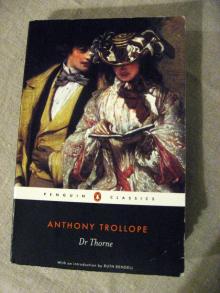 Doctor Thorne
Doctor Thorne Can You Forgive Her?
Can You Forgive Her?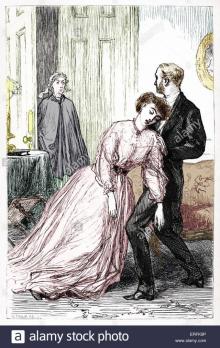 The Last Chronicle of Barset
The Last Chronicle of Barset The Fixed Period
The Fixed Period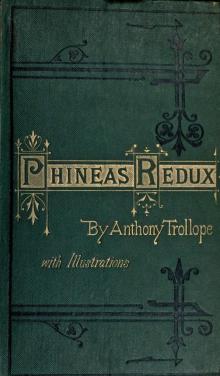 Phineas Redux
Phineas Redux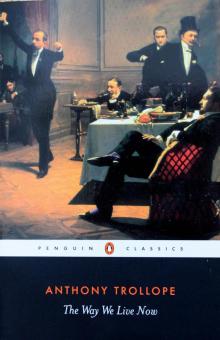 The Way We Live Now
The Way We Live Now Castle Richmond
Castle Richmond The Bertrams
The Bertrams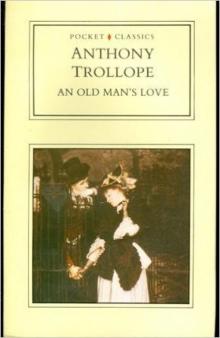 An Old Man's Love
An Old Man's Love The Belton Estate
The Belton Estate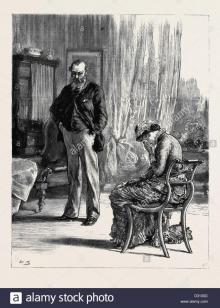 Marion Fay: A Novel
Marion Fay: A Novel The Claverings
The Claverings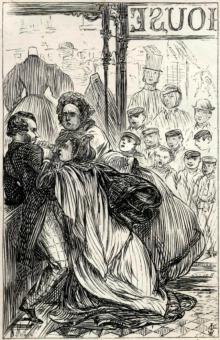 The Struggles of Brown, Jones, and Robinson
The Struggles of Brown, Jones, and Robinson Nina Balatka
Nina Balatka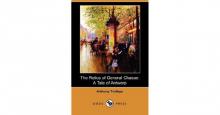 The Relics of General Chasse: A Tale of Antwerp
The Relics of General Chasse: A Tale of Antwerp Barchester Towers cob-2
Barchester Towers cob-2 The Chronicles of Barsetshire
The Chronicles of Barsetshire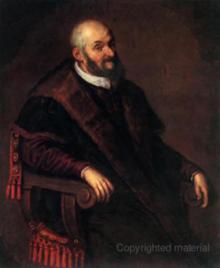 The Warden cob-1
The Warden cob-1 Framley Parsonage
Framley Parsonage Christmas at Thompson Hall
Christmas at Thompson Hall The Warden
The Warden The Palliser Novels
The Palliser Novels The Small House at Allington
The Small House at Allington Barchester Towers
Barchester Towers The Small House at Allington cob-5
The Small House at Allington cob-5 The Duke's Children
The Duke's Children Phineas Finn, the Irish Member
Phineas Finn, the Irish Member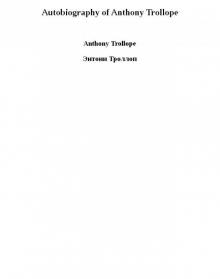 Autobiography of Anthony Trollope
Autobiography of Anthony Trollope